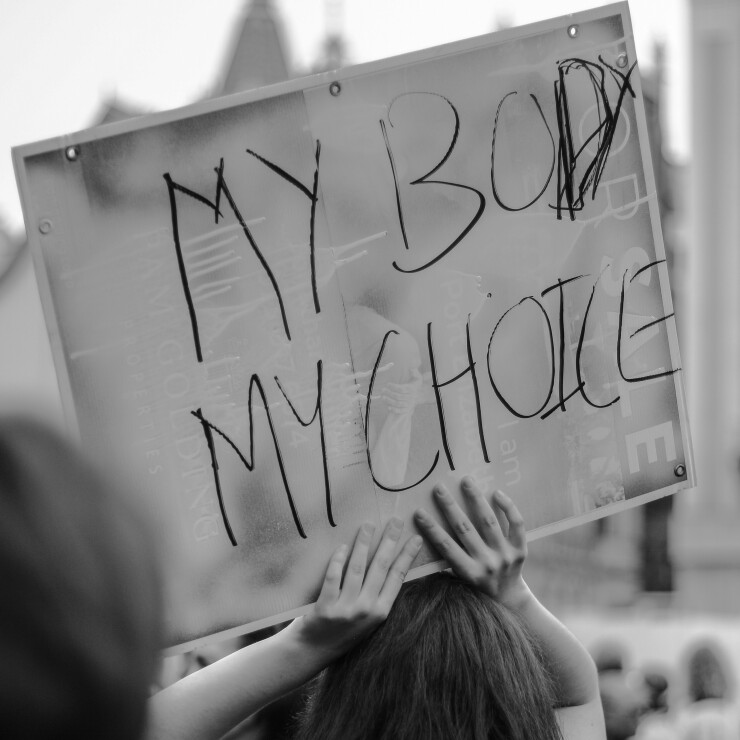Monday night, millions of Americans were confronted with potentially life-changing news: for the first time in United States history, they may find themselves with fewer rights than their parents and grandparents before them.
The
While the news may have been shocking to some, Monifa Bandele, chief strategy officer at social welfare organization and advocacy group MomsRising, has been anticipating this decision for months.
Read more:
“The decision was a decisive cutting down of a woman’s right to access abortion care,” says Bandele. “I think of my own grandmother, 50 years ago, who was a nurse and fought to achieve these rights. And now we are watching it slip under our watch.”
Justice Alito states that the right to abortions should be up to the people’s elected representatives, meaning there will no federal law or ruling to stop states from banning and criminalizing abortions. In turn, 26 states are at risk of losing the right to abortion care, impacting more than 36 million women who are of reproductive age, according to Planned Parenthood.
For Bandele, this is a threat to millions of mothers and families, especially those who may be faced with economic or health-related barriers. Six in 10 women who have abortions are already mothers, and half of the women have two or more children, according to the CDC. Notably, Guttmacher Institute found that nearly half of the women who get abortions live below the poverty line.
“Most women who seek abortions are already mothers,” says Bandele. “When we talk about family planning, it’s important that moms have that right, not just for themselves but for their families.”
Read more:
Bandele notes that if the Supreme Court does overturn Roe v. Wade, working-class women and women of color (who disproportionately make up the share of low-wage workers in the U.S.) will suffer the most, since they will not have the means to access care in states with reproductive rights still in place. This doesn’t even account for disparities within healthcare; Black women face a maternal mortality rate three times higher than non-Hispanic White women, according to the CDC.
The language used in the draft opinion may also reflect a willingness to strip back more than abortion care rights. Bandele underlines this as a major cause for concern and outrage.
“The inescapable conclusion is that a right to abortion is not deeply rooted in the Nation’s history and traditions,” Justice Alito writes in the leaked draft opinion. This statement not only implicates women’s autonomy but the autonomy of anyone who is not white, cis-gendered, male and heterosexual, explains Bandele.
“Women’s rights, Black people’s rights, indigenous people’s rights, immigrants of color’s rights and LGBTQ rights are not rooted in this nation’s history,” she says, referencing concerns that the court may next reverse decisions granting the rights to same-sex marriage, interracial marriage and access to contraception. “We were not part of that initial conversation when you talk about the Bill of Rights. So to say that is the reason why Roe cannot stand is a very dangerous and slippery slope.”
Bandele considers this draft opinion to be like a canary in a coal mine — a not-so-subtle warning of what’s to come under this current Supreme Court.
“What I hear in the decision, as a Black woman, is that the goal is to go back to white patriarchal supremacy,” she says. “This is pushback against the power of people who are rising to make the nation realize the democracy it professes to be.”
However, this does not mean that all hope is lost. Congress can still pass the Women’s Health Protection Act, which would protect the right to abortion care as federal law. In fact, the bill was passed by the House of Representatives last September but failed to receive the 60 votes it would need to bypass the filibuster and proceed to a Senate vote. WHPA would create a statutory right for healthcare providers to provide abortion care, and the right for patients to receive said care. Although, there is still a possibility that the Supreme Court could deem WHPA unconstitutional in a future case.
“The people we have elected into office can try to make this right,” says Bandele. “Congress can do it, the president can sign it and the Women’s Health Protection Act can protect abortion for everyone.”
Many elected officials may have the majority of voters on their side. According to a Washington Post-ABC News poll conducted in April, 54% of Americans believe Roe should stand, while 28% believe it should be overturned.
Read more:
In the meantime, MomsRising and its over one million members plan to pressure legislators across the country and mobilize for the November midterms election, especially in states where abortion care rights are at risk.
“In those states, we have to roll up our sleeves and make sure they pass laws that protect a woman’s right to access abortion care,” says Bandele. “Right now, we need all hands on deck, because we are in it for the long haul.”
Bandele encourages employers and businesses to donate to abortion funds and organizations advocating for reproductive rights. She emphasizes directing resources to states whose legislators will attempt to ban abortion care as soon as Roe is overturned, such as Arkansas, Idaho, Kentucky, Louisana, Missouri, Texas, Tennessee, Utah and Wyoming. These states have “trigger” bans, which are laws that would go into effect immediately or by quick state action as soon as Roe is gone.
“We are going to keep fighting and organizing to put in place the elected officials that are going to protect our rights,” says Bandele. “Collectively, we have tremendous power.”






